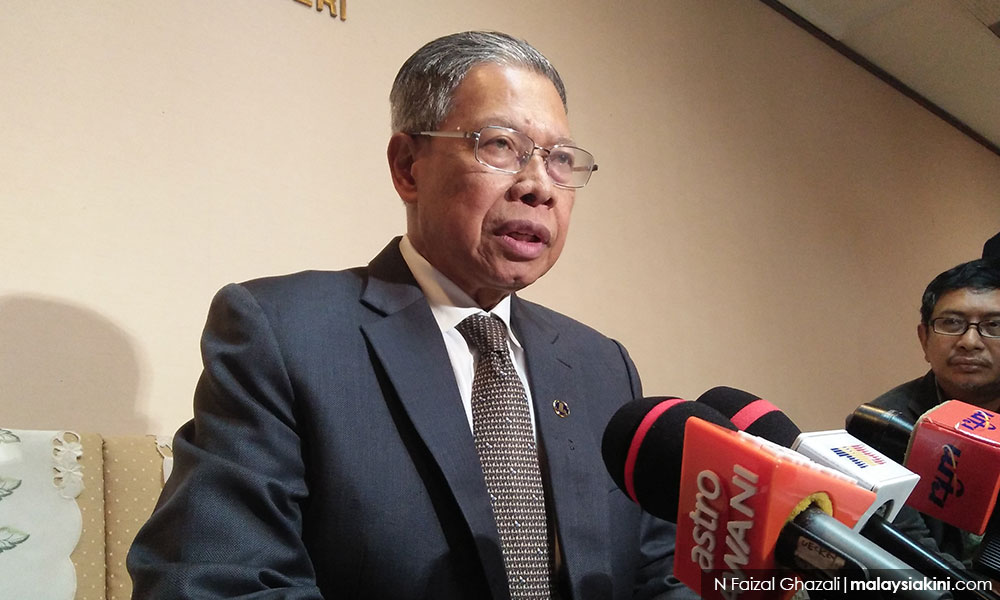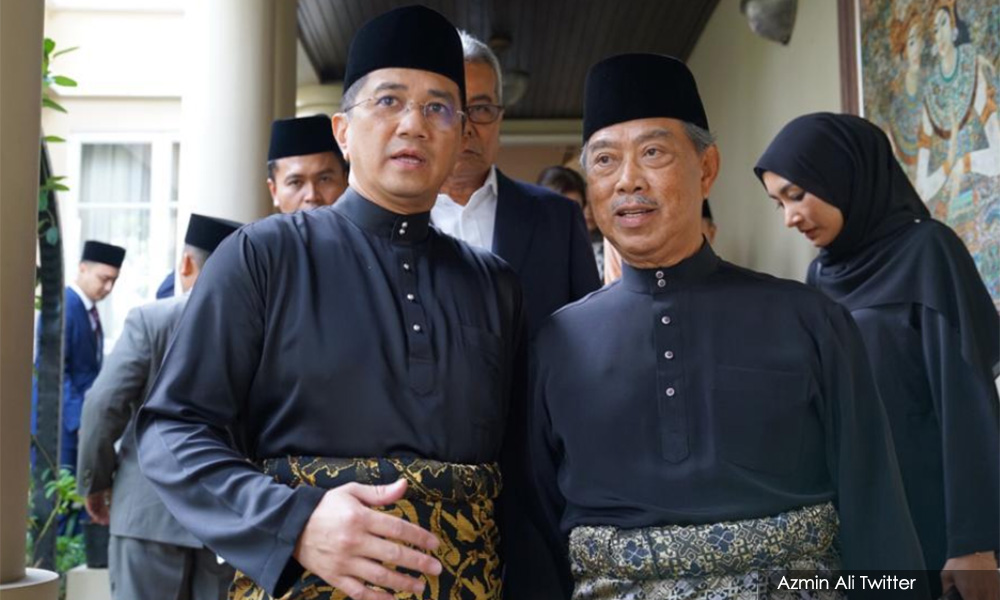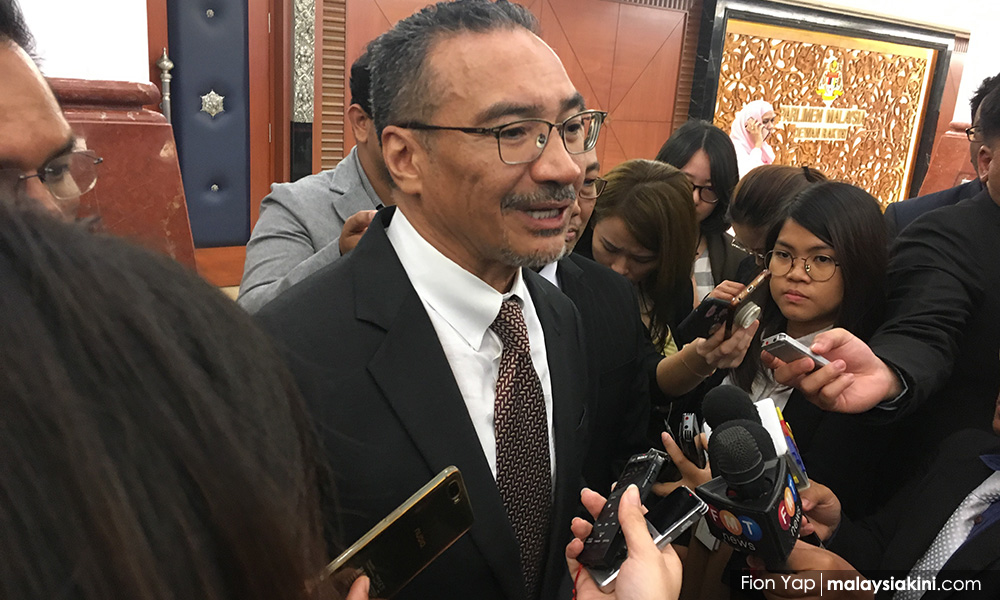Prime Minister Muhyiddin Yassin yesterday sought to unveil a Perikatan Nasional cabinet that is both palatable to the public and political stakeholders but without ceding too much control that it could empower rivals and weaken his own position.
In keeping with his “government of integrity” message, Muhyiddin, who is also the Bersatu president, kept with the previous Pakatan Harapan government’s practice by not taking up the finance ministry portfolio.
Between 2001 and 2018, the prime minister has also been the finance minister, a concentration of power that has been blamed, in part, for the 1MDB scandal.
Instead, Muhyiddin appointed a political outsider – CIMB group executive chief officer Tengku Zafrul Tengku Abdul Aziz – as the new finance minister.
However, Tengku Zafrul is not an outsider to Muhyiddin’s family.
An analyst who is part of former prime minister Dr Mahathir Mohamad’s team, speaking on condition of anonymity, believes family ties would allow Muhyiddin to exercise considerable influence on Tengku Zafrul.
He pointed out that Tengku Zafrul is related to Muhyiddin’s family through his younger brother Tengku Zuhri Tengku Abdul Aziz, who was an Umno Youth exco leader who unsuccessfully contested for a supreme council position in the 2018 party polls.
Tengku Zuhri is married to Fara Nadia Abd Rahim, whose elder sister Fara Ikma Abd Rahim is married to Muhyiddin’s eldest son Fakhri Yassin.
Tengku Zafrul and Muhyiddin’s family ties
The women are daughters of businessperson Abd Rahim Mohamad, who controls Eden Inc Sdn Bhd, and Fakhri is also on the company’s board.
“Muhyiddin may not hold the finance ministry portfolio and Tengku Zafrul may be a technocrat but their relationship means Muhyiddin can influence him,” he said.
However, family ties do not diminish Tengku Zafrul’s experience as the 46-year-old has been in the financial sector for more than two decades and is well respected in the industry.
Appointing an outsider would also mean Zafrul will more likely listen to Muhyiddin rather than being influenced by other parties.

Furthermore, while Muhyiddin may not exercise direct control on the finance ministry portfolio, he has dissolved the Economic Affairs Ministry.
Minister in the Prime Minister’s Department Mustapa Mohamed (above), who is also Bersatu’s Jeli MP, will oversee the portfolio and Muhyiddin will have a big say as the portfolio is now back under the Prime Minister’s Department.
The analyst believes the change is essentially a downgrade for Gombak MP Azmin Ali and can help contain his influence. Azmin previously led the Economic Affairs Ministry portfolio but is now moved to the International Trade and Industry Ministry.
Azmin was instrumental in the creation of the Perikatan Nasional government as he masterminded the defections of 10 PKR MPs, including himself, to Bersatu, without which the new coalition government would not have been possible.
Losing the pork barrel
To illustrate how much of a downgrade it is for Azmin, the Economic Affairs Ministry under Budget 2020 had an estimated allocation of RM3.24 billion. The vast majority of this sum, or RM2.724 billion, is in developmental expenditure, meaning projects can be doled out.
In contrast, the estimated budget for the International Trade and Industry Ministry is RM1.74 billion with only RM865 million in developmental expenditure, less than a third of the Economic Affairs Ministry’s developmental expenditure.
Furthermore, the development expenditure for the Economic Affairs Ministry has a more domestic focus – useful for politicians who may want to consolidate their positions, while the International Trade Ministry’s development expenditure has a more outward focus.

Echoing this view is opposition senator Liew Chin Tong, who in a statement said it was a “demotion” for Azmin despite being named a “senior minister”.
“Azmin is now demoted to international trade and industry minister whereas, under the Pakatan Harapan government, he was in charge of the all-powerful Economic Affairs Ministry.
“I am quite sure Azmin is now a disappointed man after spending more than a year as the prime mover of the recent political coup. His supporters too would have wanted him to be handsomely rewarded.
“It was Mahathir who created the Economic Affairs Ministry for Azmin to reduce the size and involvement of the Prime Minister’s Department in the economy,” he said.
Liew said Muhyiddin now appears to have full control of the country’s development expenditure.
Apart from controlling the country’s purse, Muhyiddin also managed to ensure that key ministries remain in the hands of Bersatu ministers such as the Home Ministry and Education Ministry.
However, the Mahathir-aligned analyst says that the new cabinet does not only curb Muhyiddin’s rivals but also Umno president Abdul Zahid Hamidi’s opponents, even though Zahid himself is not part of the cabinet.
Hisham kept busy overseas
While Umno did get some important portfolios, Zahid’s main rival in Umno got relatively less significant portfolios.
For example, Sembrong MP Hishammuddin Hussein (below) was asked to lead the Foreign Ministry which has an estimated budget of RM817.8 million with a meagre RM93 million in developmental expenditure.
The portfolio is relatively small compared to his past experience as defence minister and home minister.
“The portfolio also means that Hishammuddin will need to travel overseas a lot and limit the time he has for local politics,” says the analyst.

Hishammuddin was a key conspirator with Azmin who worked on gathering enough MPs to support a new government under Mahathir, sometimes going behind Zahid’s back.
But Mahathir’s refusal to work with Umno as a whole forced them to side with Muhyiddin.
The winners in Umno are Bera MP Ismail Sabri Yaakob’s Defence Ministry which has an estimated budget of RM15.6 billion for 2020 with RM3.08 billion in developmental expenditure and Mersing MP Abd Latiff Ahmad’s Rural and Regional Ministry which has an estimated of RM8.42 billion with a whopping RM5.22 billion in developmental expenditure and a rural focus that is a key base for Umno.
Outsider thwarts PAS
For PAS, the crown jewel would most likely have been the position of minister in the Prime Minister’s Department in charge of Islamic affairs, which Muhyiddin kept away from the Islamist party’s grasp by again appointing an outsider.
Muhyiddin co-opted Federal Territories mufti Zulkifli Mohamad Al-Bakri, a moderate religious figure, to helm the position.
Instead, PAS’ most senior figure in the government, Tuan Ibrahim Tuan Man, got the Environment Ministry, an unusual fit for the PAS deputy president.
However, PAS’ Pengkalan Chepa MP Ahmad Marzuk Shaary will be Zulkifli’s deputy.
With the Perikatan Nasional government only just formed and goodwill still aplenty, the component parties will likely tolerate such manoeuvring.
Mahathir, who was out-manoeuvred by Muhyiddin to form the new government, had described Muhyiddin as someone riding a tiger and has no choice but to keep going as stopping would mean being eaten by the tiger.
Whether Mahathir’s words hold true remains to be seen as the true test of the coalition’s strength and cohesiveness will come in the next three years, if it survives – or thwarts – an expected confidence vote when Parliament convenes on May 18.
MKINI



No comments:
Post a Comment
Note: Only a member of this blog may post a comment.